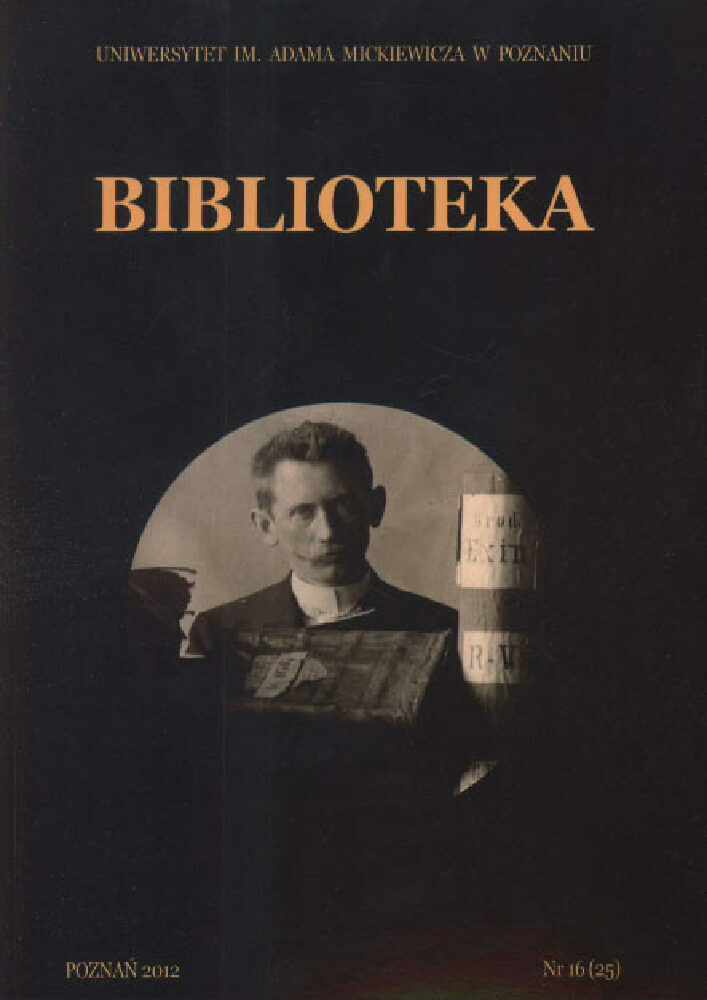Abstract
The ever-changing, dynamic and increasingly more and more demanding environment of the modern research library exerts pressure on innovative processes related to changes in the applicable managing model. The article discusses the changes in the organization and the managing system at the library of the University of Eastern Finland that had to be effected as a result of a merging process of individual library units into one. The article provides a description of a number of the said transformations at the level of the organizational structure, acquisition policy, storage and circulation of resources and at the level of human resources management within the context of the concept of the institution that has to learn in the process and can adjust itself to unstable environment and the following changes. Within this concept, the library is also to be in position to be ready to adopt alternative solutions that would secure continuity and further development of the institution.References
Balague N., Saarti J., Benchmarking quality systems in two European academic libraries, „Library Management” 2009, t. 30, nr 4/5.
Druk informacyjny The Kalevala Collection (University Library in Joensuu 2010).
Jasiński B., Elastyczność organizacji jako odpowiedź na turbulentne otoczenie, w: Zarządzanie przedsiębiorstwem w turbulentnym otoczeniu, red. R. Krupski, Warszawa 2005.
Juntunen A., Saarti J., Bringing out the best of everyone: A systematic approach to the workplace coaching and learning at the Kuopio University Library, Finland, „Library Management” 2011, t. 32, nr 8/9
Kananen J., Ovaska T., Saarti J., Collection policy management for the Kuopio University and Kuopio University Hospital, Finland: detecting the needs of users and developing high-quality collections, „Health Information and Libraries Journal” 2006, t. 23, nr 3.
Muhonen A., Saarti J., Vattulainen J., Managing the life cycles of the document and library collections in Finnish academic libraries, „Library Management” 2010, t. 31, nr 8/9.
Ovaska T., Professional development by work shadowing, „Journal of EAHIL” 2009, t. 5, nr 4.
Saarti J., Challenges for Library space; space for books or space for users; the case of Kuopio University Library, „Journal of EAHIL” 2009, t. 5, nr 4.
Saarti J., Juntunen A., From the rhetoric of quality management to managing selforganizing processes: a case study on an expert organization, w: Advances in Library Administration and Organization, red. E.D. Garten, D.E. Williams, J.M. Nyce, S. Talja, t. 25, Oxford 2007.
Stańczyk-Hugiet E., Organizacja ucząca się, w: Zarządzanie przedsiębiorstwem w turbulentnym otoczeniu, red. R. Krupski, Warszawa 2005.
License
Copyright (c) 2012 Hanna Grabowska

This work is licensed under a Creative Commons Attribution-ShareAlike 4.0 International License.
Utwory opublikowane w czasopiśmie Biblioteka, na platformie Pressto należącej do Uniwersytetu im. Adama Mickiewicza w Poznaniu od 2015 roku są udostępniane na
licencji Creative Commons Uznanie autorstwa-Na tych samych warunkach 4.0 Międzynarodowe.
Tym samym wszyscy zainteresowani są uprawnieni do korzystania z utworów opublikowanych po 2015 roku pod następującymi warunkami:
- uznania autorstwa czyli obowiązek podania wraz z rozpowszechnianym utworem informacji o autorstwie, tytule, źródle (odnośniki do oryginalnego utworu, doi) oraz samej licencji
- na tych samych warunkach — remiksując utwór, przetwarzając go lub tworząc na jego podstawie, należy swoje dzieło rozpowszechniać na tej samej licencji, co oryginał.
Uniwersytet im. Adama Mickiewicza w Poznaniu zachowuje prawo do czasopisma jako całości (układ, forma graficzna, tytuł, projekt okładki, logo itp.).
Autor zachowuje prawa majątkowe, ale udziela zgody Uniwersytetowi im. Adama Mickiewicza w Poznaniu na wykorzystanie dzieła. Autorzy tekstów zakwalifikowanych do publikacji proszeni są o wypełnienie podpisanie i przesłanie umowy.
Jeżeli autor artykułu nie jest przekonany, że może wykorzystywać cudze utwory (np. ilustracje, fotografie, tabele) w ramach cytatu we własnej tekście musi dostarczyć do redakcji czasopisma zgodę od uprawnionych podmiotów.
Prawa są zastrzeżone do wszystkich tekstów opublikowanych przed rokiem 2015.





